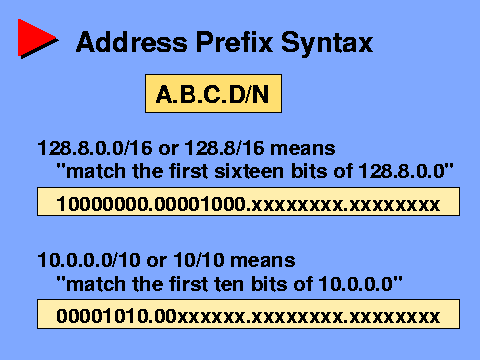
IP address prefixes are patterns which match the first n binary bits of an IP address.
The standard syntax is to write the prefix bits that must match in dotted-quad format, followed by a slash and then the number of bits in the prefix. Any trailing bits, not part of the prefix, are written as zero. If an entire trailing byte is zero, it can be written explicitly, as in 128.8.0.0/16, or omitted, as in 128.8/16. Since only the first sixteen bits are significant (in this example), it would be meaningless to specify the remaining sixteen bits, so there’s no ambiguity in omitting them.
- 128.8/16 means to match 10000000 00001000 as the first sixteen bits, and would match 128.8.74.1, 128.8.8.8, and 128.8.0.0, but not 128.9.7.3
- 10/10 means to match 00001010 00 as the first ten bits, and would match 10.41.173.13, 10.10.10.10 and 10.13.94.1, but not 10.128.7.1 (pay attention to the second number).
- 208.130.28/24 means to match 11010000 10000010 00011100 as the first twenty four bits, and would match 208.130.28.1, 208.130.28.255, and everything in between.